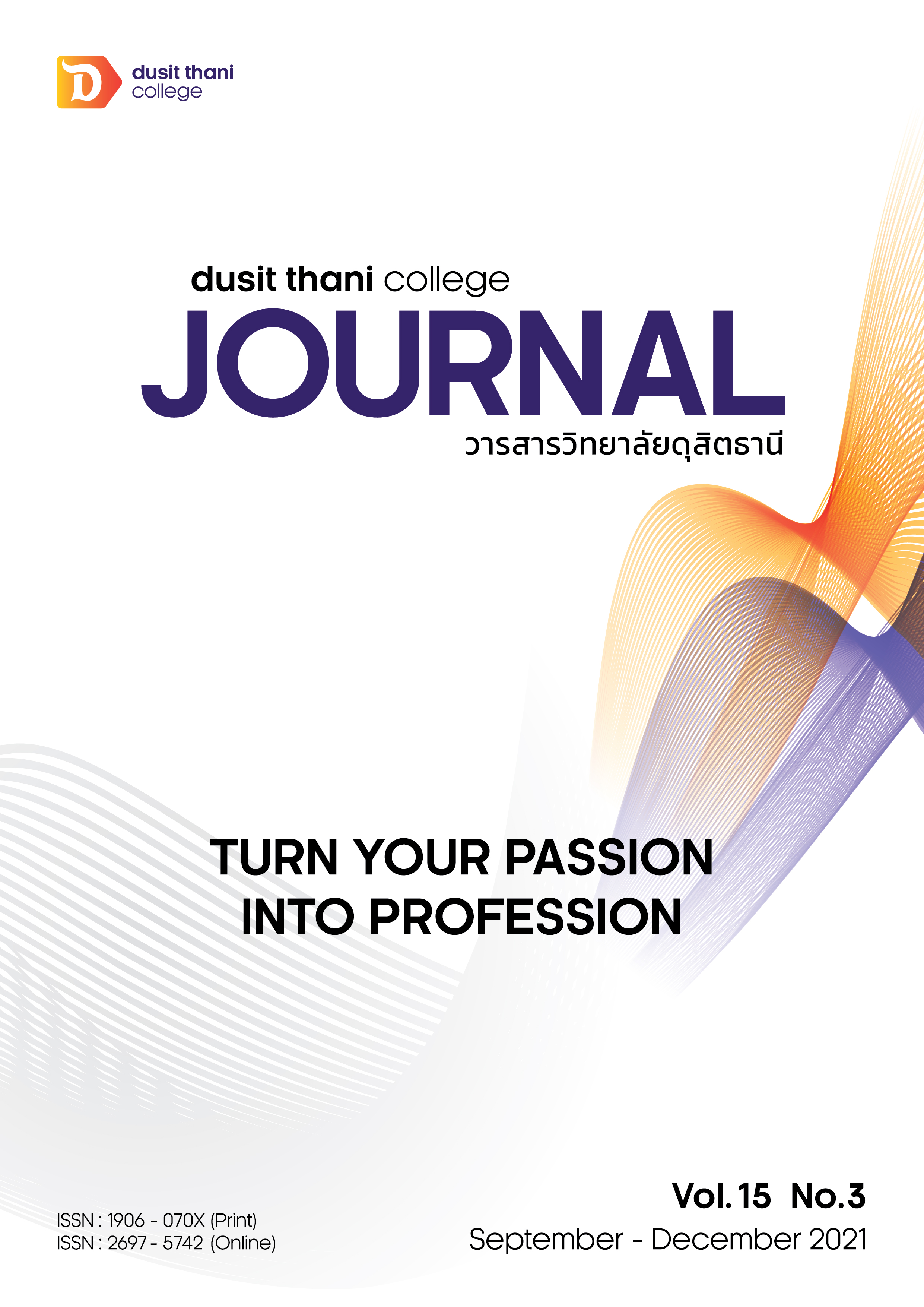USERS’ SATISFACTION IN PILOT TESTING OF THE EDUCATION INNOVATION (ONLINE LEARNING MEDIA) FOR STUDENTS IN MASTER OF BUSINESS ADMINISTRATION, DUSIT THANI COLLEGE
Main Article Content
บทคัดย่อ
This research was aimed to study the pilot testers’ opinion and satisfaction in the online learning media for students in Master of Business Administration, Dusit Thani College following the education innovation concept in 5 aspects, consisting of 1) the efficiency, the effectiveness, the quality, and the appeal of the online learning media 2) the satisfaction on the online learning media 3) the factors that significantly influence the satisfaction in online learning media and 4)the problems faced during the pilot-testing and the suggestions which can be used to develop the future online learning media. This study was a mixed method research. For the quantitative research, online questionnaires were conducted from 46 pilot testers. Descriptive Statistics were used in the analysis. The hypotheses were tested using Independent T-Test, One-way ANOVA and Multiple Regression Analysis. For the qualitative research, in-depth interviews were conducted. The key informants were 5 academic experts and 10 MBA students.
Results of the study showed that the pilot testers agreed at the high level on the efficiency, the effectiveness, the quality, the appeal and the overall satisfaction on the online learning media. Different gender and age of the pilot testers showed no significant difference in the overall satisfaction on the online learning media at P-value 0.05. Efficiency and appeal of the online learning media significantly influenced the pilot testers’ overall satisfaction on the online learning media at P-value 0.05.
From in-depth interview, the pilot testers were satisfied with the comprehensiveness and the length of the content. They were able to learn anywhere and review the content for many times. There was no report about any technical problems occurred. For the suggestions, the result showed that the online learning media should be more appealing.
Article Details
นโยบายการพิจารณากลั่นกรองบทความ
- บทความวิจัยและบทความวิชาการทุกเรื่องที่จะได้รับการตีพิมพ์ต้องผ่านการพิจารณากลั่นกรองโดยผู้ทรงคุณวุฒิ (Peer Review) ในสาขาที่เกี่ยวข้อง จำนวน 3 ท่าน/บทความ
- บทความ ข้อความ ภาพประกอบและตารางประกอบที่ลงตีพิมพ์ในวารสารเป็นความคิดเห็นส่วนตัวของผู้เขียน กองบรรณาธิการไม่จำเป็นต้องเห็นด้วยเสมอไป และไม่มีส่วนรับผิดชอบใด ๆ ถือเป็นความรับผิดชอบของผู้เขียนแต่เพียงผู้เดียว
- บทความที่จะได้รับการตีพิมพ์จะต้องไม่เคยตีพิมพ์ เผยแพร่ที่ใดมาก่อน และไม่อยู่ระหว่างการพิจารณาของวารสารฉบับอื่น หากตรวจสอบพบว่ามีการตีพิมพ์ซ้ำซ้อน ถือเป็นความรับผิดชอบของผู้เขียนแต่เพียงผู้เดียว
- บทความใดที่ผู้อ่านเห็นว่าได้มีการลอกเลียนหรือแอบอ้างโดยปราศจากการอ้างอิง หรือทำให้เข้าใจผิดว่าเป็นผลงานของผู้เขียน กรุณาแจ้งให้กองบรรณาธิการวารสารทราบจะเป็นพระคุณยิ่ง
เอกสารอ้างอิง
Asanok, Manit. (2018). Development, Efficiency and Effectiveness of Innovation for Self-learning Model. Journal of Educational Technology and Communications. Faculty of Education Mahasarakham University, 1(2), 9-18. (in Thai).
Aujirapongpan Somnuk, Vadhanasindhu Pakpachong, Chandrachai Achara, & Cooparat Pracob. (2010) Innovation: the terms and classifications which play vital role in the Innovation Capability of the entrepreneurs. Journal of Business Administration, Thammasat Business Journal, 33(128), 49-65. (in Thai).
Best, J.W. (1981). Research in Education. New Jersey: Prentice Hall.
Chaemmchoy, Sukanya. (2012). Concept of Innovation for School Management in the 21st Century. Journal of Education, Naresuan University, 14(2), 117-128. (in Thai).
Kryukov, V., & Gorin, A. (2017). Digital technologies as education innovation at universities. Australian Educational Computing, 32(1), 1-16.
Lertputtarak, Sarunya. (2011). Mixed methods: quantitative and qualitative research in business management. Journal of Graduate School of Commerce-Burapha, 6(1), 7-16. (in Thai).
Muchimapiro, Vachirasake. (2014). The Role of Educational Innovation in Learning. Ratchaphruek Journal, 12(2), 1-9. (in Thai).
Office of the Education Council. (2017). The National education plan B.E. 2560-2579. Retrieved from http://www.onec.go.th/index.php/book/BookView/1540
Office of the National Economic and Social Development Council. (2018). National Strategy 20 years 2018 – 2037. Retrieved from http://plan.bru.ac.th/%E0%B8%A2%E0%B8%B8%E0%B8%97%E0%B8%98%E0%B8%A8%E0%B8%B2%E0%B8%AA%E0%B8%95%E0%B8%A3%E0%B9%8C%E0%B8%8A%E0%B8%B2%E0%B8%95%E0%B8%B4-20-%E0%B8%9B%E0%B8%B5-%E0%B8%9E-%E0%B8%A8-2561-2580/
Permpool Panuchanart & Phrapratanporn Bundit. (2018). Educational Service Innovations Influencing the Achievement of the Master of Business Administration Program to prepare for Thailand 4.0. Graduate School Conference, 1(2), 394-402. (in Thai).
Pongpan, Bang-orn. (1995). General Psychology. Bangkok: Thai Wattana Panit. (in Thai).
Prommanee Pattana, Pitayavatanachai Yupin, & Tappha Jeerasak. (2020). Concepts of Satisfaction and Construction of Job Satisfaction Questionnaire. APHEIT journal, Association of private higher education institutions of Thailand. 26(1), 59-66. (in Thai).
Promwong, Chaiyong. (2013). Developmental Testing of Media and Instructional Package. Silpakorn Educational Research Journal, 5(1), 1-20. (in Thai).
Ritcharoon, Pichit. (2007). Research and Innovation Development. Bangkok. Unpublished manuscript. (in Thai).
Suwanbundit Anek, & Adulpattanakit Passakorn. (2005). Service Psychology. Bangkok: Press and Design. (in Thai).
Thepranu, Srimongkol. (2002). Handout: skills and techniques in teaching. Bangkok. Faculty of Education, Bansomdejchaopraya Rajabhat University. (in Thai).


